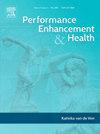调查运动员的表现信念、应对能力和心理健康之间的相互联系,以及受rebt启发的移动应用程序干预的效果
IF 3.7
Q2 HOSPITALITY, LEISURE, SPORT & TOURISM
引用次数: 0
摘要
目的探讨运动员表现信念、应对能力和心理健康之间的相互关系,并对针对这些因素的为期四周的理性情绪行为疗法(REBT)移动应用程序干预进行评估。设计与方法采用多阶段随机比较设计,对155名运动员(Mage = 26.93, SD = 11.32)进行在线调查。23名运动员(Mage = 33.70, SD = 14.15)参加了为期四周的移动应用程序干预,实验组接受了8次以REBT原则和自助活动为重点的微学习,以挑战和取代运动中的非理性思维,对照组接受了传统的心理技能训练。进一步采用Hayes’s PROCESS宏观分析发现,应对能力和非理性信念都在其与心理健康的关系中起中介作用,其中应对能力的中介作用更强。此外,独立样本t检验分析证实,在完成rbt启发的移动应用程序干预后,参与者非理性表现信念的表现显著改善。通过对定性反馈的专题分析,突出了移动应用程序作为运动中认知和情绪自我管理工具的实用性。结论结合心理技能训练来提高应对能力,应继续作为旨在改善运动员运动心理健康的REBT方法的一部分。此外,基于网络的移动干预有潜力成为一种有价值且易于获取的工具,以支持运动员的心理需求。本文章由计算机程序翻译,如有差异,请以英文原文为准。
Investigating the interconnectedness of athletes’ performance beliefs, coping ability, and mental health, and the efficacy of a REBT-inspired mobile app intervention
Objective
This study explored the interrelatedness between athletes’ performance beliefs, coping ability, and mental health, and evaluated a four-week Rational Emotive Behaviour Therapy (REBT) mobile app intervention targeting these factors
Design and Methods
A multiphase randomised comparative design was used where 155 athletes (Mage = 26.93, SD = 11.32) completed an online survey. A subset of 23 athletes (Mage = 33.70, SD = 14.15) participated in a four-week mobile-app intervention of which the experimental group received eight micro-learning sessions focused on REBT principles and self-help activities to challenge and replace irrational thinking in sport, while the control group received conventional psychological skills training
Results
Correlation analyses revealed significant associations between the factors. Further analyses using Hayes’ PROCESS macro revealed that both coping ability and irrational beliefs mediated the relationship between them and mental health, with coping ability showing a stronger mediation effect. Furthermore, independent samples t-tests analyses confirmed significant improvements in participants’ exhibition of irrational performance beliefs upon completion of the RBT-inspired mobile app intervention, with thematic analyses of qualitative feedback highlighting the mobile app’s utility as a tool for self-management of cognitions and emotions in sport
Conclusion
The incorporation of psychological skills training to enhance coping ability should remain integral to REBT approaches aimed at improving athletes’ mental health in sport. Additionally, mobile web-based interventions hold potential as a valuable and easily accessible tool to support athletes’ psychological needs.
求助全文
通过发布文献求助,成功后即可免费获取论文全文。
去求助
来源期刊

Performance enhancement and health
Social Sciences-Health (social science)
CiteScore
4.70
自引率
0.00%
发文量
27
审稿时长
57 days
 求助内容:
求助内容: 应助结果提醒方式:
应助结果提醒方式:


